
Vol. 1, No. 10 Published by India China Division, Air Transport Command March 22, 1945
|
On Homeward Leg; Overall Time
Scheduled Is Under 144 Hours
Bermuda, Azores, Will Be Route of Luxury Ship,
Handled by Staggered Crews, Slashing
ATC's Minimum Time Around World
Hq., Calcutta - Winging its way back home is a C-54 luxury airliner, the first ATC plane to fly a round trip bearing passengers on a regular schedule from New York to Calcutta.
This new service from U.S. points to AAF, ATC, ASC Hq in India operates regularly on fast through schedules. Coming from the States, the flight is scheduled to consume 69 hours, elapsed time, and going home, because of difference in prevailing winds, 74 hours and 20 minutes.
Aboard the beautifully-appointed ship as it left Calcutta the evening of March 17 was a full passenger load. En route, passengers were served hot coffee, snacks and sandwiches from the ship's galley. Every comfort of airline service before the war will be theirs, with a GI flight clerk replacing the comely stewardess.
Bucket seats - long the bane of the existence of globe-trotters using military airlines - give way to well-upholstered reclining seats on the plane, enabling passengers to read, sleep or just relax and watch the clouds go by.
Coming out, the plane left Wilmington, Del., and proceeded to New York, Bermuda, the Azores, Casablanca, Tripoli, Cairo, Abadan, Karachi and Calcutta. Going back the flight has taken the ship from Bermuda to Washington and Wilmington.
Cuts Circuit Time
Colonel, GI and civilian were aboard the giant Douglas C-54 Skymaster as it left Calcutta. Crew of the ship on the first leg home includes Capt. Ira R Johnston, Houston, Tex., pilot; Capt. Maurice Searls, New York City, co-pilot; Capt. Lauritz Kjerulff, Lake Charles, La., relief pilot; 1st Lt. B. B. McKinney, Ft. Worth, Tex., navigator; Sgt. James E. Thompson, Iowa Falls, Iowa, engineer and S/Sgt. H. G. Maxwell, Houston, Del., radio operator.
Crews on the new direct scheduled run make the entire journey in various planes, in consecutive hops, with short layovers between legs. The crew on the first hop, for instance, was relieved at Karachi after the initial leg was completed, and another crew took over for the flight to Abadan.
The new schedule cuts still further, 'round-the-world flying time via ATC. From Calcutta, priority passengers may board a plane which will take them to Ceylon and Australia, through the facilities of the ICD, and thence through the Pacific and back to the States.
For some time the ATC has maintained 'round-the-world service, but portions of the circuit were not regularly scheduled flights. They were "on-call" hops made to carry certain high priority passengers from one end of the world to another.
Furlough Deals Stretched from 30 Days to 45
WD Chief of Staff Revises Plan; Those Now Home To Benefit Too
Hq., Calcutta - Rest and recuperation furloughs in the States have been lengthened from 30 to 45 days, it has been revealed by the personnel section.
The furlough baksheesh, made possible by a directive issued by the War Department chief of staff, and applicable apparently to all commands, will concern all ICD personnel except those who actually have departed from the States for return to this theater.
All Will Benefit
According to A-1, only a few men have been "short-changed" on the deal. Not only will those whose furlough orders are cut hereafter, but those now enjoying free time at home will get the benefit of the full 45 days, it is said. Even those who may have left their homes for the port of aerial embarkation will be caught and returned to their residences for the extra 15 days.
The POAE will take care of amending the orders, to make the stretching of the furlough official and legal, if the man is stopped there before return to ICD. If the man as yet has not left his home, then the reception station where he reported will cut the proper orders and notify the vacationer that he has been given 15 days grace.
Requests to CG
ICD Stateside furloughs currently are governed by ATC Regulation 35-13 which provides opportunity for key personnel to continue, on their own volition, in a certain division after a period of rest and recuperation in Shangri-La.
Individuals desiring the furlough, in lieu of regular rotation which means sweating out quotas and returning to the States for permanent reassignment, must submit written requests to the division commander. The regulation prohibits coercion or pressure "to develop such a desire."
Air Travel
Physical exams are given those desiring such furloughs, and certification of ability to withstand continued foreign duty must be submitted with the individual's written request.
Men travel to the States and back by air. After arriving in Uncle Sugar they report to the reception station nearest their home for orders giving them free reign for 45 days.
Two years of overseas duty is the minimum eligibility requirement for ground personnel. Flying personnel must have completed the required number of air hours before they become eligible for the furlough.
Atabrine Program Fights Malaria In Assam, Bengal
Hq., Calcutta - ICD has begun a program of malaria suppression by the use of atabrine throughout the Assam and Bengal wings, it was announced this week by Col. E. A. Abbey, division surgeon.
No effort has been spared to insure the completeness and regularization of the atabrine plan, which has been put to a long, thorough test in the Southwest Pacific and found invaluable in minimizing the disease.
Kills One Type
Personnel with assemble by roster every day after a meal and each man will swallow one atabrine tablet, washed down with a glass of water. The fact that he has taken the tablet will be noted by the non-com in charge. A man who misses a day must take two tablets the following day.
Suppressive atabrine, it is pointed out, will not prevent malarial infection, though it will keep a man from becoming ill with malaria. It kills one type of malarial parasite, malignant tertian, but only suppresses the other type, benign tertian.
This means that when he gets back to the States a man may have malaria if he has been bitten but an infected mosquito. Therefore it is necessary to continue all the same personal protective means used before starting atabrine dosage, including wearing of protective clothing and use of repellent and nets.
Rumors Exploded
Because rumors concerning harmful effects of atabrine in the past have interfered with its successful application, the surgeon's office is eager to spike them at the beginning of the atabrine program in ICD.
Most pernicious, and utterly without foundation, say the medicos, is the widespread notion that atabrine induces sterility or impotence. No case of sterility or impotence due to atabrine ever has been reported from the areas where it has been administered to many hundreds of thousands of men under Army supervision.
Another erroneous rumor was exploded when exhaustive tests proved there was no diminution of night vision from the use of atabrine.
Fear of yellow jaundice also inhibits many in the use of atabrine. Atabrine is a dye, the physician points out, and one of the most natural consequences of its use is the addition of a yellowish tinge to the pigmentation of skin and eyes. This is completely harmless, Col. Abbey said.
Atabrine should never be consumed on an empty stomach, and never by a person suffering from dysentery, in whom it may cause nausea, according to the surgeon.
There is always a certain incidence of nausea among large groups beginning the preventive dosage, he added an individuals affected by this symptom should report to a medical officer at once in order that the precise cause may be determined.
Atabrine treatment will be continued until an individual has spent 30 days in the U.S. or some other area where it is not required. The fact that the individual is taking atabrine will appear on his service record, and medical officers in the area will be acquainted with the most efficacious methods of effecting cure in cases where the disease "breaks through" after cessation of the atabrine treatment.
Not One Default or Turnback, Not One Accident - Age? 41!
1328 BU, Assam - Completing his tour of duty here, Capt. Victor W. "Pop" Healey has turned in a perfect record - not a flight missed, not a turnback, not a ship turned down, not an hour of non-flying duty, and not a single accident!
The record would do credit to many a man half his age - and that's no mere figure of speech, but the literal truth, for the Spokane pilot is 41 years old.
Formerly a civilian flight instructor at Spokane airfield, "Pop" joined the Army in 1941. Before taking the instructing job he had operated his own plane as a hobby for several years, while working as a salesman for a brewery.
Ironically, at the time he completed his tour with the above enviable record, he was called upon to take a routine cardiograph check because of his age, to determine whether he was in condition to fly!
Set for Bevy of Beauts, And What Do They Get?
1326 BU, India - When the Red Cross club asked the motor pool to transport a group of Indian school girls to the base for a party, volunteers eagerly put in their bids. Visions of 16-year-old coeds had the final selectees all slicked up and ready for action. When the drivers finally reached the railroad station the girls came pouring out of the coaches - all five and six-year-olds, adequately chaperoned.
Napoleon Sans Josephine Comes, Sees, Stays Awhile
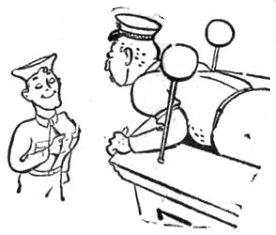
1327 BU, Assam - Sgt. Napoleon Bonaparte is working at this base.
No, he is not just a man who has been here too long. In fact, he just came here - and he is really Napoleon Bonaparte.
Wherever the sergeant has gone, all his life, astonishment has greeted the announcement of his name. In Brooklyn, though, where he made his home before entering the Army, he had his most awkward moment.
Picked up for speeding one night, he and two Brooklyn friends were asked their names.
"John Adams," said the first, speaking honestly.
"James Cagney," said the second, with equal veracity.
It was two strikes against Napoleon, but he had to tell the truth.
"Bunch of wise guys, eh?" snarled the cop, and invited the trio in to tell it to the desk sergeant. After the latter had established the truth of all three statements and exacted a fine, says Bonaparte, "he still didn't like us!"
Sgt. Bonaparte has three brothers in the service. One, Joseph, is a namesake of the little corporal's brother, later king of Spain and Naples.
Napoleon has never bothered - never, rather, cared to spend the $300 he estimates it would cost - to trace his genealogy and possible relationship to the Corsican.
He is a member of the regular army and has served at Mitchel Field and McDill Field since enlisting in the Air Corps in 1940. He is assigned here as an aerial engineer.
Napoleon like being named Napoleon Bonaparte. He's a friendly sort of guy, and having such a conspicuous handle, he says, enables him to greet a great many people and strike up new acquaintances.
Digging Up Brick, Discover Skeleton
1328 BU, Assam - A startling discovery was made here recently by personnel who uncovered part of a human skeleton while digging up brick for a porch.
The discovery was made only a few feet from the Area 4 mss hall, near a large tree, by Sgt. Alfred Ogden, a cook.
Besides the bones, a knife and what looked as if it once might have been a bracelet were found. From the amount and color of rotted cloth uncovered, local "detectives" surmised that the remains were those of a woman.
Fire Leaves One Record, Several GIs Minus Clothes
1333 BU, Assam - When a recent fire devastated four tents, it destroyed a GI collection of records, leaving only one - called, "I Don't Want To Set The World On Fire."
Several GIs were left almost in the nude. One was enjoying a hot shower (in Assam?) while his tent and clothes burned. He salvaged one pair of trousers and his toilet kit. A telephone operator kept receiving calls about the fire but had to sweat it out until relieved - only to find that his had been one of the tents to burn. A thoughtful buddy saved his wife's pictures.
A GI asleep in one of the tents at first thought it was only the Assam weather but then realized that even the weather could not get that hot.
Northern Burma Telephone Loop Knits ICD Base
Don Ameche Not Present, But Stateside Circuit Gets Hooked Up
1348 BU, North Burma - Out of a maze of wires, poles and insulators a new telephone system recently emerged for this base unit which would bring a smile to the lips of Don Ameche.
The system was installed here in record time, and the new network is considered one of the finest of its kind in CBI.
CWO Adrian Ramus, Oakland, Calif., and his energetic crew not only stretched the wires but hacked their way through the jungles to bring back telephone poles. After shaping the logs, the communications men dug holes, placed the poles in the ground, and promptly started climbing up to string wire.
Sgt. Dominic H. Barone, Buffalo, N.Y., wire chief, supervised most of the intricate connection work for the "Burma Telephone Co." A veteran of telephone installations in the Assam valley, Sgt. Barone considers this his toughest undertaking but by far his best result.
The shift to modern communications inspired an intricate switchboard, and the busy operators also handle calls for several nearby outfits. There are even facilities for dial phones, in the event the communications men do another revamping job in an effort to top their latest endeavor.
|
To Compensate Compasses
1306 BU, Karachi - The periodic adjustment of airplane compasses, which tend to go haywire rather easily, promises to be a much simpler job in the future than it is now, thanks to the development of a "compass swing computer" by Sgt. Stanley Wawrzynek, instrument mechanic from Detroit.
The apparatus consists of just two discs, one slightly smaller in diameter than the first. Both are calibrated in degrees and spaced with the basic compass markings. In order to find the compensation necessary for an off-the-beam compass, an instrument man needs only to take the reading of the master compass and the reading of the compass being adjusted, then align the discs and look at the reading appearing in the slot on the upper disc.
Wawrzynek points out that incorrect compensations are made with the co-efficient method because the algebraic answer can be either plus or minus. A man somewhat hazy on college algebra has a 50-50 chance of making the adjustment to the wrong side of true north, thus throwing the compass reading off twice as far. The new computer eliminates that possibility.
The Wawrzynek gadget has been sent on to higher headquarters for general AAF utilization by the engineering officer of the 1306, Lt. Col. Harvey Miller. Helping to prepare the first full-scale working model were Cpl. Robert E. Judson, of South Bend, Ind., and Sgt. John Baran, of Rankin, Pa.
Assam GIs Donate Rs. 10,000, Spend Their Off-duty Hours Helping Catholic Missionaries
Richmond Hill Corporal Plays Leading Role in Their Contributions
1327 BU, Assam - "They were a stroke of God's will," was the way Father Joseph Dal Brol, SC, priest in charge of the St. John Bosco mission in Assam, expressed his appreciation for the help American GIs have given to the institution.
"Were it not for the American servicemen in this area, I do not know how our mission would have existed for the past few years," he went on, explaining his gratitude.
Yellen Top Donor
The Catholic servicemen at this base have contributed more than 10,000 rupees to this mission, plus a good deal of spare time. Top donor at this field is Cpl. Frank Yellen of Richmond Hill, Long Island, who has spent most of his off-duty hours assisting at the mission.
Deeply interested in this work, Cpl. Yellen informed his family of the grave conditions that exist in the upkeep of the institution. Touched by their son's letter, they sent him $500 to be donated to the mission.
Pay in Rice
The mission is educating local residents and furnishing food and lodging for orphans and poor children. Boys can be sent to the mission school and boarded for only 40 pounds of rice a month and five rupees a year; girls for 25 to 30 pounds of rice a month.
Stories of Reunion Include Sons, Etc., Brothers-in-law Too
1326 BU, India - Tales of reunion in ICD are legion. Familiar are yarns of startled brothers, fathers, sons, meeting in astonished recognition.
Brother-in-law and brother-in-law also meet, as witness the recent encounter of Lt. Robert Blankenship
|
One More Reunion - Old Boss This Time
1347 BU, Assam - It may have been Sgt. Phil Klein's imagination, but he thinks he heard Lt. Abe Oliver muttering something about "a raise" as the lieutenant made his way to a States-bound airplane for a permanent change of station.
If he was muttering at all, that would have been the logical thing to mutter, as Klein, chief clerk in the P & T passenger section here, had just given Oliver his Stateside ticket, in their first encounter in 26 months.
The raise ought to come when Klein goes back to work for Oliver in Baltimore, where the two have been boss and employee (but also friends) for eight years.
Equip Ambulances with Oxygen Tanks
As Shock Combatant
1327 BU, Assam - A common Stateside practice in Air Corps hospital detachments was emulated recently at this base with the installation of oxygen tanks in ambulances.
Now infrequent in the ambulances of Assam units, this piece of life-saving apparatus is expected to be generally adopted.
Primarily, oxygen finds its greatest use in cases of severe shock. Crew members of a crashed plane at a considerable distance from a hospital thus are enabled to combat the resulting shock and a painful road-trip before receiving medical attention.
Only recently a seriously-ill GI arrived at the hospital in perfect physical condition for an operation because oxygen had been administered en route.
Ambulances being used both for crash work and general duty have been equipped with tanks. Drivers and enlisted medics have been instructed in their use.
Three Shots in One Just Experimental, Warns Head Surgeon
Hq., Calcutta - If you're looking forward to a one-shot job when you need four immunizations, you might as well quit now.
Although experiments with injecting several vaccines simultaneously have been carried out, such action is not in accord with Army regulations, according to ICD's division surgeon, Col. E. A. Abbey, who added that it is also contrary to sound medical practice.
"The reasons are of a technical nature, and of no interest to non-medical personnel," Col. Abbey said. "They are well-founded on accepted scientific facts. Therefore, in the future, you and I and all of us will take our shots by the multiple puncture method, just as we have before."
(Ed's note: HUMP EXPRESS has a red face for having raised your hopes too high, and hurries to straighten the record.)
|
To India by Division Planes
1340 BU, Kunming - ICD recently gave a helping hand to a colony of Norwegian missionaries evacuated from North China.
The missionaries, members of the Norwegian Lutheran church, totaled about 100. They were from the Chinese provinces of Honan and Hupeh. Some had been stationed at their mission for more than 40 years, and many of them had reared families.
For almost all, it was their first airplane ride, and for many their first sight of one. Crew members found the babes-in-arms an inquisitive lot, because for the younger children it was the first time in the "outside" world.
Brought to this base, the missionaries and their families were flown to Calcutta where arrangements were to be made for their eventual return to Norway.
'Orientation' of Civilians Effected at Assam Base
1330 BU, Assam - A "good neighbor policy" recently put into effect here has brought groups of the allies in Assam to this base for orientation in ICD facilities and missions.
"Civilian orientation" was the keynote of the first two events, when a group of 30 Indian students of a Baptist missionary school were conducted through the installation, followed by 30 members of a tea planter's association on the second tour.
The Assam Valley Light Horse, a group of army personnel, were third to be given an inside view of air transport activities here.
They were given an almost complete run of the base, and were particularly interested in the film, "The Mission of the ATC."
|
To Safe Stop
Minus One Engine and Brake,
Pilot Steers Off Runway To Save Ship
1348 BU, North Burma - With an engine out, flaps inoperative, and the brakes acting up, a C-46 made an SOP emergency landing here and started rolling toward the end of the strip - and a 15-foot drop.
As the transport continued its roll, the pilot, Lt. William R. Norton, made a split-second decision. Startled onlookers saw the airplane veer to the right, zigzag through gas drums, chase a jeep down a road, and finally come to halt on an incline, with all hands as safe as a War Bond!
Circling the field with a feathered prop and a failing hydraulic system, The Rock Island, Ill., pilot, F/O John N. Hanselman, Hugo, Okla., co-pilot, and Cpl. Arnold S. Bukowsky, San Antonio, Tex., radio operator, all started working feverishly.
Bukowsky was pumping hydraulic fluid to the brakes, while Hanselman was cranking down the landing gear. After the wheels were lowered, the lieutenant started his glide. Heading for the strip, he discovered the flaps were out.
Fast approaching a dead-end and not having any safe alternative, Lt. Norton turned the plane off the runway, luckily avoiding the fuel dump, to make his miraculous stop.
"I didn't worry much until I got out of the airplane," said Lt. Norton. "My chief concern was the jeep in front of us when I turned off the runway. I kept hoping it didn't have a governor."
Once Prisoner of the Germans Now RO in ICD
Quits Country After Nazis Confiscate Business, Imprison Jews
1339 BU, China - Out of the hands of the Gestapo and out of a Nazi prison has come Sgt. Herman Zucker, now flying radio operator with ICD.
Sgt. Zucker, who will be 40 in July and is one of the oldest radio operators in the theater, was born in Bavaria, Germany, of Jewish parents. Later his family moved to Dresden where he became a dealer in scrap metal.
Grabbed Business
As the Nazi's persecution of the Jews became unbearable, his family moved to Palestine. In November, 1938, a minor German official was assassinated in Paris by a young Pole, and the Nazis used that as an excuse to start a reign of terror on all Jewish people.
Two days later the Gestapo arrested Herman Zucker, imprisoned him and confiscated his business.
After he spent a month in prison, the Gestapo agreed to release him, provided he leave the country. He obtained his passage to Cuba and, with the equivalent of $4 in his pocket, left his homeland. After six months in Cuba he got a visa to enter the States and arrived in New York just a few days before war was declared on Germany.
Went to Palestine
After graduation from the radio operator and mechanics school at Sioux Falls, S.D., he was assigned to the ATC and shortly entered the ICD. For several months he was attached to division headquarters, as his age kept him from flying status. He was eager to fly, however, and later was put on flying status and sent to this base.
He has had one furlough during which he visited his parents in Palestine, since coming to the ICD.
Zucker has flown over 300 hours and has been chosen by the base commander, Maj. E. B. Rittemberry, as his personal radio operator.
Wants to Forget
Zucker still has a considerable German accent. One time he called a ground station for a clearance and another plane overheard the conversation and quickly called the ground and asked for a check up on that strange voice, because "It might be a Jap station." The ground station came back with a laugh and explained, "It's OK. It's just Herman."
When asked about Germany, Zucker is much concerned over the fact that Americans do not realize just how fanatic and treacherous the Nazis really are. He says that the average person will not believe stories of the barbaric treatment of his people by the Germans. He wants to forget the things that have happened, however, and is looking forward to a new life in the United States, of which he is now a full-fledged citizen.
Lecture on Phases of American Scene at Indian College
Hq., Bengal Wing - Personnel from three Bengal wing bases have been participating in the student life of one of the universities in this locality.
Not only have they attended scheduled discussion groups, on invitation, but they have delivered several addresses calculated to foster better Indian understanding of America.
M/Sgt. Norris Birnbaum spoke on American student life, comparing it with that of the Indian student. Capt. Anatol Rapoport discussed western materialism (Rapoport, a musician of no mean merit, recently gave a piano recital for an Indian musical society.)
Pfc. Alfred J. DelaFuente, a professional actor, lectured on the acting of Shakespeare in America.
Each speaker has been questioned at length following his address. The Indian student, say these GIs, is an alert and deep thinker. No holds have been barred, and some lively, though friendly, arguments have developed.
CWO David Curtis, adjutant of the Bengal wing, is preparing to take the group on an imaginary sight-seeing tour of New York and other U.S. cities, large and small, touching upon city planning, civic activity, recreational facilities, sanitation, industrial developments, business, and residential zoning.
Another Civilian Resident; He Got Married Here Too
1350 BU, Kunming - Most of the GIs "China-side" are here as a result of the feudin' now currently in progress, but Sgt. Darwin L. McMillan was here long before the shooting started.
Working with the Texas Oil Co., Sgt. McMillan came here in 1933, from Belvedere Island, Calif. For the next four years he worked in Shanghai, Tientsin, Peking and Hsian in the capacity of "administrative marketing, sales and distribution of petroleum products."
Wooed and Won
Came a six-month holiday back to the States, then another four-year hitch, this time in India. He divided his time between Delhi and Madras, and rose to the position of assistant district manager.
While he was in India, love came to Sgt. McMillan's life. He met a young Stanford co-ed on a 'round-the-world cruise, whom he wooed and wed amidst innumerable difficulties. Laws demanded the posting of a two-week ban, but after much wrangling, this was overcome. Then the approval and presence of the American consulate was needed. Finally, the ceremony could not be performed after sundown, so McMillan had to parade the streets in tails in broad daylight.
Hopes To Return
Again in 1941 came a holiday at home, after which he and his wife wished to return to the Orient. At that time the State Department refused Mrs. McMillan permission, so her husband took a post with the domestic department where he stayed until his entry into the Army in 1942.
Having been interested in languages since first coming over as a civilian, he attended ASTP as a student of Chinese. The training is helping him immeasurably in his present post in China, where he is NCO in charge of the fuel control project of the China wing.
After the war Sgt. McMillan hopes to return to the Orient with his wife and continue in the oil business.
Dunham Finds Out Others Thrifty Too
1338 BU, China - If T/Sgt. Forrest W. Dunham was trying to start something with his statement in the March 1 HUMP EXPRESS that his 1328 BU was "the savin'est ATC base in CBI-land," he certainly succeeded.
Sgt. Jack A. Schley, of Dallas, Tex., NCO in charge of personal affairs here, took one look at the article, picked up a pencil, and came up with some figures.
Soldier deposits totaled 45 percent of the net payroll. The amount deposited averages $27.65 for each man at the base and $87.68 for every man who put money into a soldier savings account.
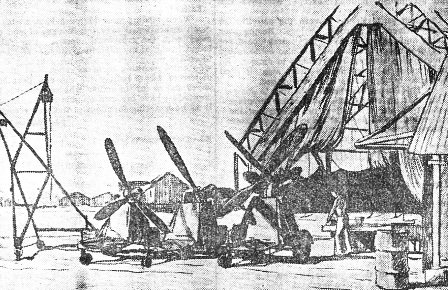 In this brush drawing, Capt. James P. Scott, ICD artist, gives another view of the prop shop in the maintenance
"assembly line" at an Assam base. Overheard inside the hangar is a rail that carries the propellers from the dollies
into the building. At the right a GI is working at a "cleaning table."
In this brush drawing, Capt. James P. Scott, ICD artist, gives another view of the prop shop in the maintenance
"assembly line" at an Assam base. Overheard inside the hangar is a rail that carries the propellers from the dollies
into the building. At the right a GI is working at a "cleaning table."
|
Hunting, Wishes He Hadn't
1332 BU, Assam - Capt. William H. Tebay, CO of Squadron "E" has well and truly earned the appellation "Buffalo Bill."
Returning to his base at 2 a.m., one night last week, the captain was hardly prepared for the guest waiting on his basha porch - a 1,400-pound water buffalo.
In no mood to receive the visitor, Capt. Tebay shooed him from the porch. Then, thinking the beast might cause further disturbance, he made off to pursue it into the jungle.
As if by magic, the half-ton bulked had melted into the night. "Buffalo Bill" probed the darkness with his flashlight - but no buffalo.
By this time Tebay was ready to believe it all had been an illusion.
Then came a mighty roar from a nearby slit-trench. The animal was trapped - bit good!
In hardly any time, a C-2 wrecker, a cowboy from Texas, 32 well-wishers and 12 know-it-alls had appeared on the scene. But all efforts to raise the buffalo were futile.
Finally an incline was dug, and an hour and a half after falling into the trench, the uninvited guest was induced out of the trench and disappeared into the jungle blackness with injured oriental calm.
Neither oriental nor calm, "Buffalo Bill" took his new nickname and his badly frayed nerves to bed.
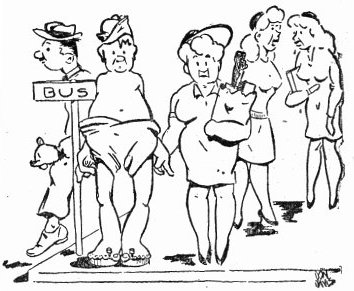
|

Something To Shoot At
At a North Burma base the tire shop men are ,looking for somebody to top the mark they set with a tire that has made more than 200 landings and has flown 405 hours.
This feat in tire utilization, under the poor runway conditions which until recently existed in Burma, comes at a time when rubber conservation is in the foreground.
A record of this kind is only possible if everyone concerned knows the do's and don'ts that go with rubber conservation.
The tire shop men in Burma had to know their business. The small stones and steel mats of hastily-constructed runways certainly had put small cuts into the long-lasting tire. But the tire men weren't influenced by its outward appearances. They knew that small cuts do not cause blowouts. When the cuts appeared, the men immediately applied their know-how in preventive maintenance.
A few harmless cuts, if filled with gum and cured as soon as the plane taxies to a stop, never will cause a blowout. The tire that causes the trouble is the one that has been abused by pilots and crew members.
Those who handled the plane which set the tire record knew what not to do. They were aware of the fact that pivoting a plane on a locked wheel puts a strain on the inside plies, resulting in the rupture of so many plies that the tire becomes unsafe. Perhaps on the next day, maybe on the next trip, the tire would blow.
Nobody raced hell-bent down a taxi strip or made a sharp turn into a revetment. Everyone realized that such a procedure might be digging a grave for some other airmen. A tire may look OK on the surface but if bruised by a rock or distorted in a sharp turn, it might blow out at some critical moment. The previously injured plies finally wear down the tube and remaining plies until the whole structure lets go. Too often it happens on landing - all because some pilot was careless or bounced hard on some runway and then didn't report the incident so the tire could be dismounted for inspection.
Not only airplane tire handling, but ground vehicle use affords a real opportunity for men in ICD to do their part in the drive to conserve rubber. Quick starts and stops take a heavy toll and accomplish nothing except excessive tire wear.
Common sense should govern the activities of every driver of a truck or jeep. Racing over rubble and jagged stones at break-neck speed not only presents a tire hazard, but also subjects the driver and passengers of a vehicle to danger. So that which is beneficial to tires also is good insurance for occupants of a conveyance.
The Burma base has led the way in showing that an educational and safety program does pay off. Emulating this throughout the division, the 35 percent reduction in tire consumption easily can be accomplished.
'Your Brother's Keeper'
Nowhere does the phrase, "Your Brother's Keeper," have greater meaning than in flying.
The pilot of a Hump-crossing airplane places his life in the hands of a number of persons. Whether he will get safely to his destination depends upon the man who repaired his plane, the man who serviced it, the man who gave him weather information, the man who guided him by radio, the man who briefed him before he took off, and others. If any of these people slip up, the pilot will pay for it. If the mechanic who repairs his magnetos does a sloppy job, it may cost the pilot's life and the lives of his crew. If the fellow who services the airplane errs in the amount of fuel, this may cost the pilot his life. If radio gives a wrong bearing, if weather reports the wrong conditions en route, if briefing forgets to tell him Field X is closed - any of these mistakes can have most grievous results.
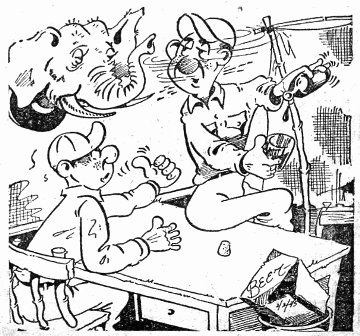 "Shot him? Nope, drank him to death!"
"Shot him? Nope, drank him to death!"
|
Each pilot is also his own brother-pilot's keeper. The care with which he handles the airplane he flies, the safety precautions he takes to protect its brakes, its hydraulic system and other equipment is "life insurance" for the next ICD pilot who flies it.
One of the most grievous acts a pilot can commit is failure to carefully report malfunctioning of any part of the aircraft he has been flying, regardless of how minor it may be, before the next pilot assigned to the plane takes off.
The man who has the hard luck to bounce a heavily loaded plane placing an undue strain on the landing gear, and then fails to report to engineering for an inspection before another man flies the plane, is likely to expose the next pilot to much harder luck if the gear has been damaged internally in the landing.
"Do unto others as you would have them do unto you" certainly holds good for the men who fly ICD's planes - and if practiced, undoubtedly would pay off in golden dividends for all pilots - not for just the "other fellow," but for you.
Few other men at war depend to such an extent upon the ability, the efficiency and the honesty of others. Surely these people are "Their Brother's Keeper," for a man's life - and the lives of others who are riding with him across the Himalaya mountain peaks to China - easily may hinge upon just what the others do, or don't do.
That should never be forgotten by any man who ever has anything to do with an airplane.
WILD GAME shown here is partly good eating, and all good morale. India has lots of things GIs don't like, but there are compensations, and one of the more lavish of these is visited upon sportsmen who find India's game among the most abundant and diversified on earth.
Whether it be sambar deer, boar, tiger or ducks, the bag gotten by ICD GIs and officers testifies to their prowess with the rifle or the shotgun. But most important of all is the respite which hunting affords from the tedium and strain of days or months of getting the goods over the Hump. Hunting is one of the prime facets of recreational programs developed at jungle indoctrination camps where air crews and others while away a few days "having fun" as well as getting the "know-how" on jungle survival. Right in the heart of country reputedly affording the best tiger hunting in the world, GIs have a field day as they round up jungle "beaters" who whack the undergrowth on the
AVG's Bellhop with Americans in Assam Now Admirer of Flying Tigers Now Serves Pilots Who Fly Hump 1333 BU, Assam - The most loyal bellhop in India is perhaps M. D. Nashin, "babu" of the officers' mess here. For five years he has watched American airmen come, complete their missions, and return to the U.S. He started as a bellhop with the famed Flying Tigers, when that group was fighting against the Japs in China and Burma, long before war was declared. Nashin earned the nickname of "Bell" when the men of AVG referred to him as their favorite bellhop. He kept the name later on, when he went to work for the bombardment volunteer air force in Burma, near his home in Lashio. He was evacuated to Assam by a British officer when the Japs occupied that part of Burma. Able to speak nearly all of the dialects of the various languages used by the local help here. Bell is quite an asset in seeing that things get done. His ambition is to return to his home in Burma after the Japs are driven out. This shouldn't take long, he assures one.
Beats Skins for Teagarden, Other Name Bands in Music Career 1306 BU, Karachi - Cpl. Red Hughes wasn't born with a drummer's stick in either hand. Hordes of admirers, who tingle with excitement whenever Red gets to beating the skins, may be mildly shocked at this profanation of an ideal, but the truth is that he has been playing the drums for only 16 of his 24 years. How he managed to waste the other eight years at Ocean City, N.J., is not on record. With Bunny Berigan Red was drumming with jack Teagarden's orchestra at Roseland in New York when that "greeting" came. Since then he has become a radio operator for Uncle and "enjoyed" a 21-month career in the I-B Theater which includes one bail-out over the Hump. He still likes the drums better. An offer from the late, famed Bunny Berigan enticed Red from Temple University, where he was studying harmony, and it was with the beloved Bunny that Red got his big-time start. He was with Berigan at the time of the latter's death, and then switched to Jack Teagarden's group. Likes Jam Sessions Red's never happier than when the commercial pressure is off and he can jam with like-minded musicians. He has fond memories of jam sessions at Nick's in Greenwich Village, center of authentic jazz, with outstanding players like Coleman Hawkins and Count Basie. The "road" no longer has any appeal for Red Hughes. After the war he plans to settle down around Philly with some up-and-coming local band. Remaining a sideman, and a good one, is Red's post-war aim. Much Vexed Pilot Walks Out of Hills, Finds He is Father 1340 BU, Kunming - Capt. Kenneth C. MacGillivray was beset with plenty of troubles during a recent flight in China. To begin with, his wife was "expecting," and communications with Flint, Mich., being what they are, the problem was a big one. To make matters worse, weather conditions developed into a storm of gale proportions and closed every field within flying radius. When the gas tanks ran dry, the crew bailed out. The walkout was without serious incident, but for Capt. MacGillivray it was a long sweat. But it's all over now. When he reported back to his office, there was a wire on his desk informing him he was the proud father of a 7-pound baby boy. Pamphlet Hits Individuals As Chief Accident Sources Hq., Bengal Wing - Carelessness, incapacity and neglect have been the foremost cause of accidents, according to a pamphlet, "Flying Safety Notes," prepared by Capt. Claude W. Smith. "Flying safety does not operate in an office in this or higher echelons of command. It may originate there, but becomes effective with the individual pilot and every crew member." The flying safety officer asserted pilots must plan their flights with "extreme deliberation and care," adding that the "routine" attitude has no place in Hump operations. His suggestions continued: "The capabilities of all personnel must be carefully screened. Carelessness and gross negligence go hand in hand. We cannot allow them to play any part in the performance of our duty. "You must do your part, and remember - the foundation for the successful consummation of a flight is the pre-flight planning and the careful and conscientious cooperation of every crew member . . . " Hump Group Pits Wits, Gets Mitts on Schlitz Kits 1347 BU, India - "Dream Girl," a reliable old C-109, has paid off her crew. The payoff was two cases of Schlitz. Maj. Lowell C. Brown, Pittsburg, Pa., director of aircraft maintenance here, has set aside two cases of beer each month for the winners of a contest which takes in safety, maintenance and round trips over the Hump. The "liquid gold" went to S/Sgt. C. M. Smith, Troy, Ala.; Sgt. H. W. Dunn, Elmira, N.Y.; Pvt. L. E. Leuty, Joplin, Mo.; Pvt. H. P. Hayden, Attleboro, Mass.; Cpl. W. H. Callaghan, Chicago, and Sgt. C. E. Burlingham, Ottowa, Kans. 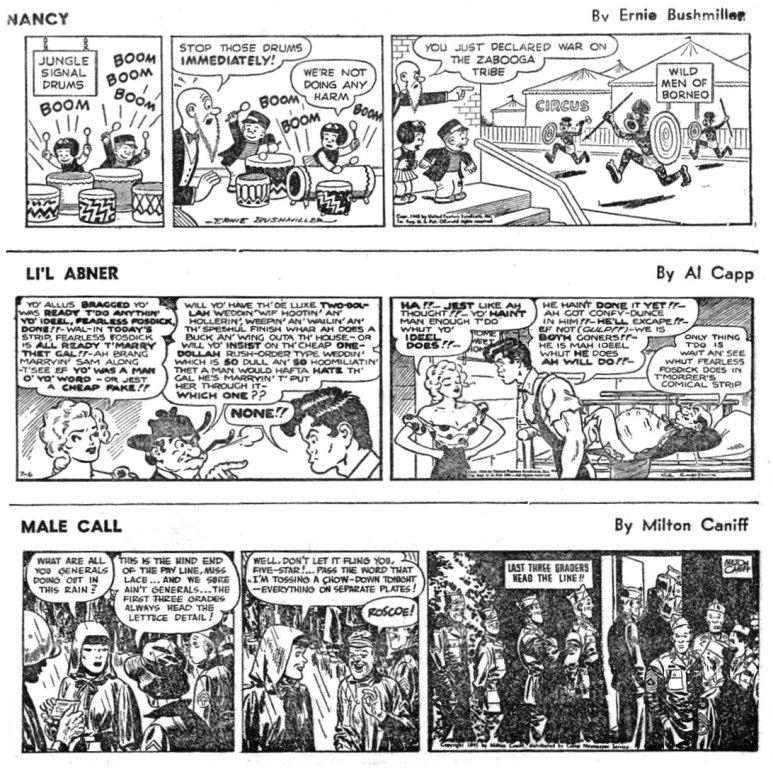
Two Pilots Flew Together in Four Theaters, Two Armies 1340 BU, Kunming - When 2nd Lt. Thurman M. Lanham, Urbana, Ill., and 1st Lt. Martin J. Gillman, New Orleans, La., met in a cafe in Quebec, Canada, early in 1942, they took an almost instant dislike to one another. In fact, they almost came to blows. "Gillman was too damn cocky," says Lanham. "Lanham was lording it over everybody in the place," says Gillman. But, war and service in the air forces of two nations and in four theaters of operation have changed that first impression into a deep friendship which has finally brought them together to Kunming. Returned to Canada Both civilian pilots, Lanham and Gillman joined the Royal Canadian Air Force in 1942; both became instructors, served together, teaching young Canadians to fly. Then Lanham became a test pilot, a search-rescue pilot in the Arctic and later went overseas to the European theater with a fighter group in the RAF. When the U.S. entered the war, Gillman and Lanham, who had returned from England to Canada, resigned from the RCAF and volunteered for the USAAF. With no idea of each other's whereabouts, the two friends met in the operations office of the ATC C-46 training unit at Reno, Nev., and almost had themselves thrown in the brig for the enthusiasm of their reunion. At Reno they talked personnel into sending them together to Nashville, Tenn. At ATC's overseas staging station there they were assigned as pilot and co-pilot (neither will admit who was pilot) to ferry a C-46 overseas to North Africa. "We got there despite weather, mechanical trouble - and Gillman," says Lanham. Rooming Together The North African Division of ATC assigned Lanham to ICD. It took a personal visit to the CO, but when Lanham shipped out, Gillman went too. Assigned to an Assam station for a short while, Gillman was alerted for transfer to China. This time Lanham went to the CO, "It's this way, sir," he said. "We've been together through ---." Lanham went too. Now they're both at this base, rooming together, and inseparable on and off the base. When the reporter talked to Lt. Lanham, he discovered that the Urbana pilot made his first solo flight in 1932 in an OX-5 Curtiss Robin - owned by the reporter at Urbana.
On-the-job Training 1306 BU, Karachi - To relieve a shortage of airplane mechanics, this base has inaugurated a program to turn embryo greaseballs into full-fledged maintenance men. Reversing the usual collegiate practice of many hours of book study augmented by lab work, these student mechanics work a regular eight-hour shift on the line and then complete daily studies with two hours of classroom theory and explanation. Twenty different phases of aircraft maintenance are taken up and, since the emphasis is on speed, the course is completed in 23 days. Classroom pointers are given by Lt. Edward Creed, Lt. Harold Siebler and S/Sgt. Theodore Frango, with the aid of two technical representatives. Better Mouse Trap Spells Final Doom For Craving Rodent 1347 BU, India - Songs have been written and phrases have become hackneyed concerning the man who "builds a better mouse trap." Capt. Arthur Pirisky, Denver, Colo., went ahead and built one. When he received a long overdue Christmas present from his wife, a slice of fine old cheese took the captain's fancy. He put the morsel on a shelf atop his nightstand. A small, slender bamboo rod leading to the shelf was the only means by which a tiny visitor could ransack the hoard, so he foresightedly greased the bamboo rod, then placed his tin hat full of soapy water squarely beneath it and went to sleep. Hours later, when the stud games had quieted down, out came Mickey on a recon mission. Curious and hungry for the cheese, Mickey did a tight-rope act over the rod to snare the prize. There was a quick skid, a soft plop, and a fainter splash. End of Mickey.
Makes 'Rash' Statements If you guys will just be good boys, you won't have to worry much about heat rash this year. There are words to that effect in a paper published at an Assam ICD base. The fundamental morality of the article giving tips on how to minimize the rash is indicated by this bit: "Alcoholic indulgence during the day is not good. A couple of drinks or a few beers at night are not bad, but moderation should be practiced always. Less interesting, perhaps, but infinitely more beneficial is the increased use of fresh water and cool fruit juices." The article, however, gets off to a questionable start with its opening line: "Heat rash easily can be the most miserable affliction to assault a fellow who sojourns in Assam this summer . . . " There's no argument about the misery of heat rash, but those who have put in a summer in Calcutta or some of the other hotter-than-Hades India spots may be inclined to look down their noses at the implication that heat rash abounds only in Assam. For those not engaged in heavy physical work, it's a good idea to cut down to two meals a day and avoid potatoes, bread and other starches, including such goodies as pie, cake and ice cream, says the Heat Rash editor. But
"There will be occasions, naturally, when a touch of starches will be necessary if a man is to eat, but those times will be relatively few . . . " And now for the toilet: A shower with mild soap once a day is advised. If more frequent showers are desired, they should be taken without using soap, so that the skin's natural oils will not be dried out. A generous powder dusting should top off the rinse, it is suggested. Lest the reader become too hopeful, the following stipulation is made: "These steps are not guaranteed to prevent the plague altogether, but they will ease it materially if followed closely." So there you have it. > Chapel Club Holds Its First Banquet At 1326 Base Unit 1326 BU, India - Celebrating its one-month anniversary, the 1326 Chapel Club held its first banquet recently. Food, decor and program were reminiscent of Stateside proceedings. Special guests included Lt. Col. Herbert S. Beeks, CO, and visiting nurse personnel. Recent club activities have included a tiger hunt, two fishing jaunts, programs by three foreign missionaries, sponsoring of two basketball teams, and publicity for religious services on the post. Cpl. William C. Murphy, of Dallas, Texas, is president of the group. HUMP EXPRESS is the official newspaper of the India-China Division, Air Transport Command, APO 192, c/o Postmaster, New York, N.Y., and is published by its Public Relations office. Camp Newspaper Service and Army Newspaper Service features are used, reproduction of which is prohibited without permission of CNS and ANS, 205 East 42nd St., New York, 17, N.Y. Other material is submitted by staff members, ICD-ATC base Public Relations sections and other soldier correspondents. Printed weekly by the Hindusthan Standard, 3 Burman St., Calcutta, India, and distributed each Thursday. Passed by U.S. Press Censor for mailing.

MARCH 22, 1945 Original issue of HUMP EXPRESS shared by CBI veteran Grover P. Fike Similar, better quality image of Jane Russell substituted for the original. Copyright © 2008 Carl Warren Weidenburner TOP OF PAGE PRINT THIS PAGE ABOUT THIS PAGE E-MAIL YOUR COMMENTS PREVIOUS ISSUE HUMP EXPRESS BASE NEXT ISSUE |
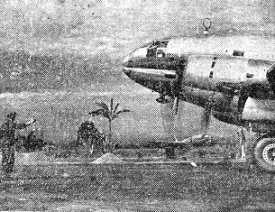 The GI at left gives a pilot the signal for takeoff as the chocks are pulled from the wheels of this C-46. The
scene, photographed at 1332 BU, is typical of the unceasing transport activity at bases in ICD. The palm in the
background gives the photo a touch of Miami atmosphere.
The GI at left gives a pilot the signal for takeoff as the chocks are pulled from the wheels of this C-46. The
scene, photographed at 1332 BU, is typical of the unceasing transport activity at bases in ICD. The palm in the
background gives the photo a touch of Miami atmosphere.
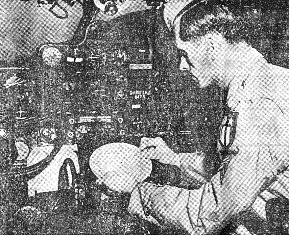 Sgt. Stanley Wawrzynek, 1306 BU, using his "compass swing computer" in the cockpit of a C-46. The simple yet
efficient device eliminates error due to faulty algebraic computations.
Sgt. Stanley Wawrzynek, 1306 BU, using his "compass swing computer" in the cockpit of a C-46. The simple yet
efficient device eliminates error due to faulty algebraic computations.
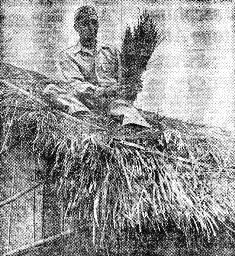 1332 BU, Assam - "Slate, tin, gravel, shingle, tire or iron roofs - those are OK, but who would ever have believed
that I'd be repairing a grass roof in India after 24 years in the top cover business?" asks S/Sgt. Phillip P. Hagan,
Long Island City, N.Y. Here he is working on a thatched roof which will undergo the crucial test during the
monsoon.
1332 BU, Assam - "Slate, tin, gravel, shingle, tire or iron roofs - those are OK, but who would ever have believed
that I'd be repairing a grass roof in India after 24 years in the top cover business?" asks S/Sgt. Phillip P. Hagan,
Long Island City, N.Y. Here he is working on a thatched roof which will undergo the crucial test during the
monsoon.
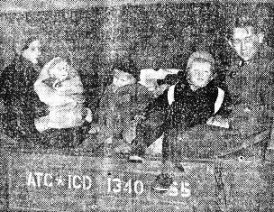 Mr. and Mrs. Bo Arne, Norwegian missionaries, and their children are on their way to Norway after ten years of
mission work in Honan province, North China.
Mr. and Mrs. Bo Arne, Norwegian missionaries, and their children are on their way to Norway after ten years of
mission work in Honan province, North China.
 When the war is over, we are all going to take that plot of land the GI Bill of Rights authorizes and have haystacks
and haystacks until something like this grows on one of them. The girl above, who packs more than a pistol is, of
course, Jane Russell.
When the war is over, we are all going to take that plot of land the GI Bill of Rights authorizes and have haystacks
and haystacks until something like this grows on one of them. The girl above, who packs more than a pistol is, of
course, Jane Russell.
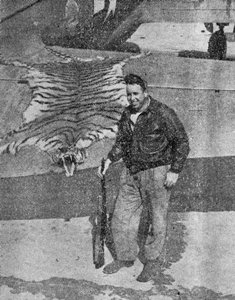 TEN-FOOT TIGER skin was acquired by Sgt. Frank B. Hoffman, Washington, N.J. Skin is called a "diploma"
at the 1330 jungle school. Hoffman's tiger, the second accounted for at the school, weighed about 500 pounds. The first one had
been killed by Cpl. Harlie D. Lacaillade, Worcester, Mass.
TEN-FOOT TIGER skin was acquired by Sgt. Frank B. Hoffman, Washington, N.J. Skin is called a "diploma"
at the 1330 jungle school. Hoffman's tiger, the second accounted for at the school, weighed about 500 pounds. The first one had
been killed by Cpl. Harlie D. Lacaillade, Worcester, Mass.
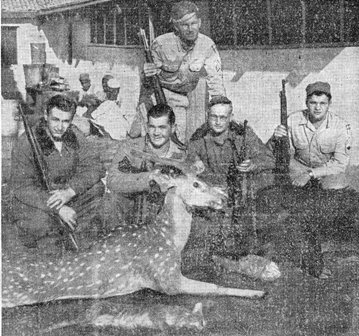 DEER, BOAR, WILDCAT were spoils of Sgt. Leonard B. Smith, Nashville (standing); Sgt. John Niedenfuer, Minneapolis;
T/Sgt. Robert B. Quandt, Indianapolis; Pfc. Virgil S. Wilhite, Mt. Pleasant, Tenn., and M/Sgt. Hewey M. Rozzell,
Nowata, Okla. Quandt, mess sergeant at 1311, served the deer for chow next day.
DEER, BOAR, WILDCAT were spoils of Sgt. Leonard B. Smith, Nashville (standing); Sgt. John Niedenfuer, Minneapolis;
T/Sgt. Robert B. Quandt, Indianapolis; Pfc. Virgil S. Wilhite, Mt. Pleasant, Tenn., and M/Sgt. Hewey M. Rozzell,
Nowata, Okla. Quandt, mess sergeant at 1311, served the deer for chow next day.
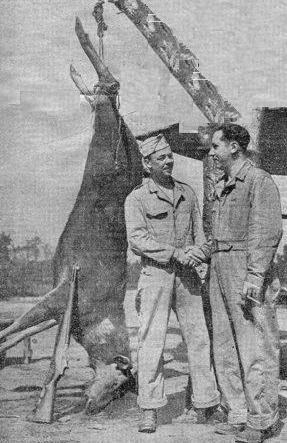 700-POUND SAMBAR fell to Capt. John Wallwork, Arlington, Mass., and Lt. David Silbert, Mt. Vernon, N.Y.,
who congratulate each other at their Assam base after stringing up the sambar.
700-POUND SAMBAR fell to Capt. John Wallwork, Arlington, Mass., and Lt. David Silbert, Mt. Vernon, N.Y.,
who congratulate each other at their Assam base after stringing up the sambar.
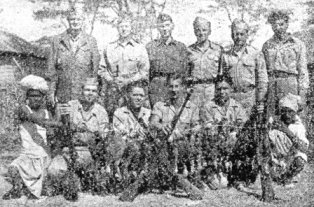 FIFTY DUCKS were knocked down by a party of ten from 1347 BU, who pose with some of the bag on return.
The hunt was arranged by Capt. Roy Johnson, Franklyn Grove, Pa., after a local khan had graciously thrown open his game
preserve to the 1347.
FIFTY DUCKS were knocked down by a party of ten from 1347 BU, who pose with some of the bag on return.
The hunt was arranged by Capt. Roy Johnson, Franklyn Grove, Pa., after a local khan had graciously thrown open his game
preserve to the 1347.
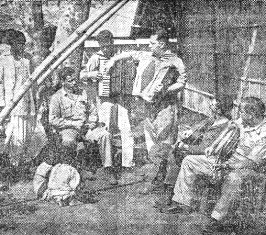 1347 BU, India - A dhoti-draped "babu" and two little kibitzers look on as Cpl. Charles Bush, Greenfield, Ohio,
conducts one of his informal music instructions. Bush's classes have become a form of relaxation from Hump-flying
duties for both aerial and ground crews. Left to right: Cpl. Ludlow Lozier, Glen Ellyn, Ill., Sgt. Bill Butler,
Sandusky, Ohio; Cpl. Bush; Pvt. Bill Barth, St' Louis, Mo., and Lt. Christopher Psotka, Little Falls, N.Y.
1347 BU, India - A dhoti-draped "babu" and two little kibitzers look on as Cpl. Charles Bush, Greenfield, Ohio,
conducts one of his informal music instructions. Bush's classes have become a form of relaxation from Hump-flying
duties for both aerial and ground crews. Left to right: Cpl. Ludlow Lozier, Glen Ellyn, Ill., Sgt. Bill Butler,
Sandusky, Ohio; Cpl. Bush; Pvt. Bill Barth, St' Louis, Mo., and Lt. Christopher Psotka, Little Falls, N.Y.
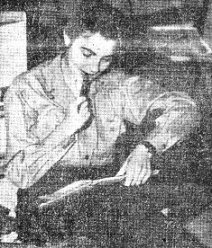 1333 BU, Assam - Nurse Evelyn Page wastes no time in getting those letters written, telling of her arrival in Assam.
She is one of the nurses who arrived here with a medical evacuation unit. The letter, incidentally, is very likely
addressed to her husband, Lt. Robert Page, serving with Gen. Patton's army in France.
1333 BU, Assam - Nurse Evelyn Page wastes no time in getting those letters written, telling of her arrival in Assam.
She is one of the nurses who arrived here with a medical evacuation unit. The letter, incidentally, is very likely
addressed to her husband, Lt. Robert Page, serving with Gen. Patton's army in France.
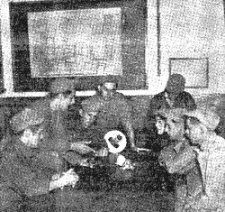 S/Sgt. Theodore Frango, White Plains, N.Y., explains a hydraulic unit at the 1306 BU as mechs supplement on-the-job
training with classroom discussion. Listening are Pvt. Robert Rudy, New Haven, Conn., at Frango's right, and (clockwise)
Pvt. Robert Ritzdorf, Cedar Rapids, Neb.; Pvt. Thomas Samuelson, Maynard, Iowa; Pfc. Stanley Clark, Provo, Utah; Pvt.
Millard Raney, Newport, Ark.' Cpl. William Mekush, and Sgt. Martin Kavinsky.
S/Sgt. Theodore Frango, White Plains, N.Y., explains a hydraulic unit at the 1306 BU as mechs supplement on-the-job
training with classroom discussion. Listening are Pvt. Robert Rudy, New Haven, Conn., at Frango's right, and (clockwise)
Pvt. Robert Ritzdorf, Cedar Rapids, Neb.; Pvt. Thomas Samuelson, Maynard, Iowa; Pfc. Stanley Clark, Provo, Utah; Pvt.
Millard Raney, Newport, Ark.' Cpl. William Mekush, and Sgt. Martin Kavinsky.
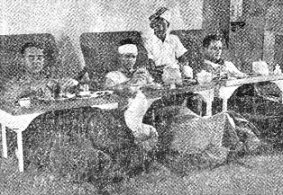 1303 BU, Agra - At this important stop on a heavily traveled route, medical patients making short layovers are
rushed to the officers' club for a hot meal served on portable trays which slide snugly over their laps, while they
recline on an adjustable back-rest fitting over their stretchers. Here three EM pose as patients - doing a job which
might almost fool medics - to demonstrate the equipment.
1303 BU, Agra - At this important stop on a heavily traveled route, medical patients making short layovers are
rushed to the officers' club for a hot meal served on portable trays which slide snugly over their laps, while they
recline on an adjustable back-rest fitting over their stretchers. Here three EM pose as patients - doing a job which
might almost fool medics - to demonstrate the equipment.
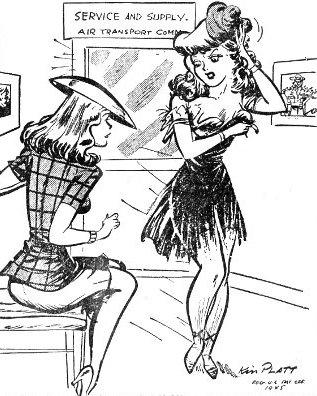 "They want you should do typing, too . . . ."
"They want you should do typing, too . . . ."